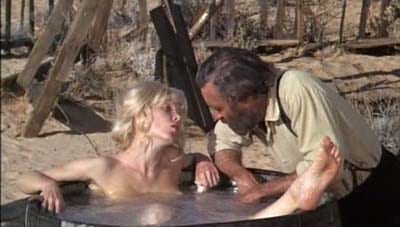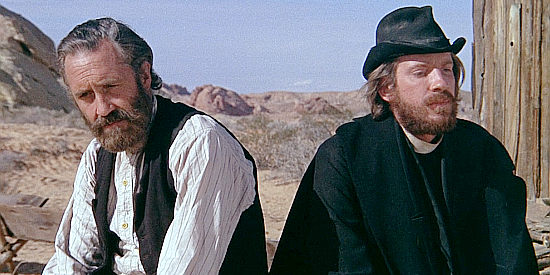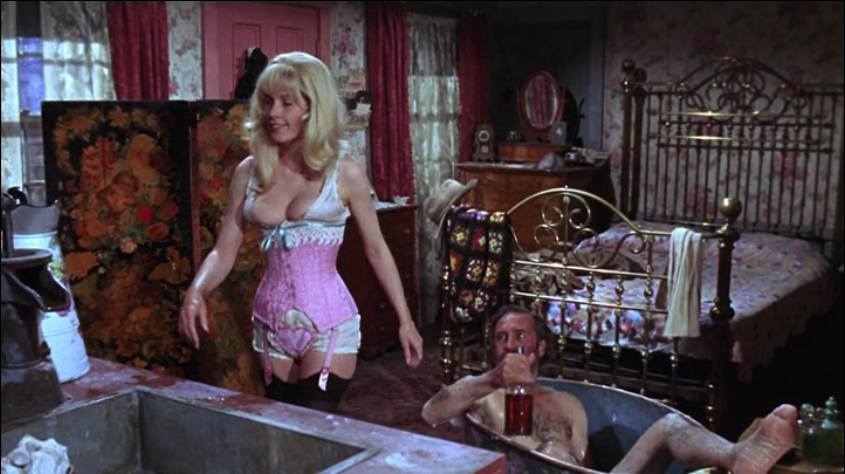← Back to Reviews
in
The Ballad of Cable Hogue
The thinking man's western, 1970's The Ballad of Cable Hogue is a warm and winning combination of revenge, romance, and character study set against a western canvas that engages the viewer completely thanks to superb direction from a surprising source and a wonderful central character that the viewer falls in love with instantly.

Jason Robards stars as Cable Hogue, grizzled old prospector who is robbed and left to die in the desert by a couple of former partners-in-crime. After days of crawling around in the desert, Cable discovers an underground spring, which he digs up and decides to build a rest stop for stagecoach drivers with the assistance of Rev. Joshua (David Warner), a creepy clergyman whose carnal desires have probably kept him on the run before meeting Cable. Cable also finds romance with a brassy and beautiful prostitute named Hildy (Stella Stevens), who puts a real crimp in the new life that Hogue has built for himself.

What can I say, I LOVED this movie. Screenwriters John Crawford and Edmund Penney have constructed the kind of story that one would not normally expect in a western setting, but makes it seem perfectly natural there. The story is initially a look at this man, who we meet at death's door who pulls himself back from the brink to forge a friendship with a man who is not really worthy of it and a romance that has him thinking about giving up his new life for a woman who might not be ready for him to do so. And just when we think it's been forgotten about it, Hogue gets the opportunity to get back at the scumbags who left him to die in the desert.

Director Sam Peckinpah, who directed another classic western The Wild Bunch, and one of my favorite actions films, 1972's The Getaway, really scores here with a story that is definitely out of his comfort zone. Peckinpah, as always, choses to tell a lot of his story with his camera and his accustomed expertise with slow and fast motion photography. One of my favorite things he does here is every moment in the film where a character is observed running, the running is done in fast motion, almost like a cartoon character, which lightens the mood and allows the viewer not to take the story as seriously as they might. The detail he puts into the relationship between Hogue and Hildy conveys a sensitivity I've never seen from this director.

The relationship between Hogue and Hildy is so enchanting because so much of it is told through the camera and not dialogue. Loved how Peckinpah documents the first moment that Hogue lays eyes on Hildy...I don't think I've ever seen the concept of love at first sight so beautifully presented on film before. The scenes when they are reunited in the desert at Hogue's rest stop are lovely. We've seen scenes like this before where a couple seems to be settling into domesticity with a musical background. What I loved here was that the musical background this time was a song actually sung by Hogue and Hildy, a storytelling tool that spoke volumes about the relationship between these two characters. And the scene where Hildy tells Hogue she's leaving and she wants more than anything is for him to beg her to stay and he can't do it, is nothing short of heartbreaking.

The film also features gorgeous Oscar-worthy cinematography and a lyrical musical score with just the right western flavor. Jason Robards is absolutely extraordinary in the title role, a dazzling and beautifully layered performance that should have earned him an Oscar nomination. Stella Stevens also gives the performance of her career in the kind of role she pretty much invented in the 1960's...the hooker with the heart of gold. Warner was a perfect combination of creepy and funny as Rev. Joshua and Strother Martin, LQ Jones, and Slim Pickens make the most of supporting roles. This is the western for people, like myself, who hate westerns, that enchants thanks to the magic of Sam Peckinpah behind the camera and the iconic Robards in front.
The thinking man's western, 1970's The Ballad of Cable Hogue is a warm and winning combination of revenge, romance, and character study set against a western canvas that engages the viewer completely thanks to superb direction from a surprising source and a wonderful central character that the viewer falls in love with instantly.

Jason Robards stars as Cable Hogue, grizzled old prospector who is robbed and left to die in the desert by a couple of former partners-in-crime. After days of crawling around in the desert, Cable discovers an underground spring, which he digs up and decides to build a rest stop for stagecoach drivers with the assistance of Rev. Joshua (David Warner), a creepy clergyman whose carnal desires have probably kept him on the run before meeting Cable. Cable also finds romance with a brassy and beautiful prostitute named Hildy (Stella Stevens), who puts a real crimp in the new life that Hogue has built for himself.

What can I say, I LOVED this movie. Screenwriters John Crawford and Edmund Penney have constructed the kind of story that one would not normally expect in a western setting, but makes it seem perfectly natural there. The story is initially a look at this man, who we meet at death's door who pulls himself back from the brink to forge a friendship with a man who is not really worthy of it and a romance that has him thinking about giving up his new life for a woman who might not be ready for him to do so. And just when we think it's been forgotten about it, Hogue gets the opportunity to get back at the scumbags who left him to die in the desert.

Director Sam Peckinpah, who directed another classic western The Wild Bunch, and one of my favorite actions films, 1972's The Getaway, really scores here with a story that is definitely out of his comfort zone. Peckinpah, as always, choses to tell a lot of his story with his camera and his accustomed expertise with slow and fast motion photography. One of my favorite things he does here is every moment in the film where a character is observed running, the running is done in fast motion, almost like a cartoon character, which lightens the mood and allows the viewer not to take the story as seriously as they might. The detail he puts into the relationship between Hogue and Hildy conveys a sensitivity I've never seen from this director.

The relationship between Hogue and Hildy is so enchanting because so much of it is told through the camera and not dialogue. Loved how Peckinpah documents the first moment that Hogue lays eyes on Hildy...I don't think I've ever seen the concept of love at first sight so beautifully presented on film before. The scenes when they are reunited in the desert at Hogue's rest stop are lovely. We've seen scenes like this before where a couple seems to be settling into domesticity with a musical background. What I loved here was that the musical background this time was a song actually sung by Hogue and Hildy, a storytelling tool that spoke volumes about the relationship between these two characters. And the scene where Hildy tells Hogue she's leaving and she wants more than anything is for him to beg her to stay and he can't do it, is nothing short of heartbreaking.

The film also features gorgeous Oscar-worthy cinematography and a lyrical musical score with just the right western flavor. Jason Robards is absolutely extraordinary in the title role, a dazzling and beautifully layered performance that should have earned him an Oscar nomination. Stella Stevens also gives the performance of her career in the kind of role she pretty much invented in the 1960's...the hooker with the heart of gold. Warner was a perfect combination of creepy and funny as Rev. Joshua and Strother Martin, LQ Jones, and Slim Pickens make the most of supporting roles. This is the western for people, like myself, who hate westerns, that enchants thanks to the magic of Sam Peckinpah behind the camera and the iconic Robards in front.
